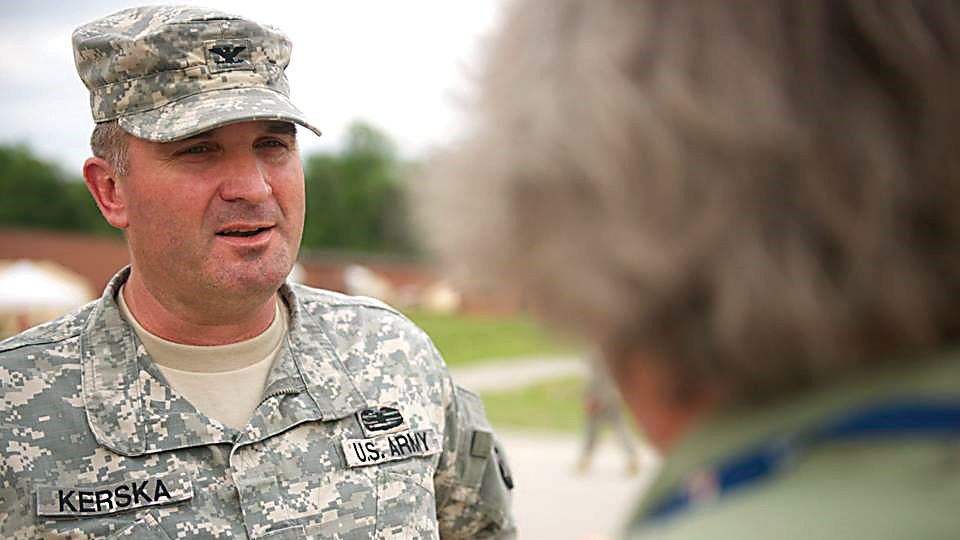When Eric Kerska ’87 graduated from high school in La Crescent, Minn., he had no real idea of what he wanted to do with his life. Looking for some direction, he joined the Infantry Company in Winona a few months prior to his high school graduation, receiving his initial entry training in Benning, Ga. When he returned home, his mother told him that she had registered him for classes at Winona State University. Classes had already started.
“I moved into a house with four other guys I didn’t know on Huff Street,” Kerska recalled. “One of my roommates had a Class A Army uniform on, and I asked why? He said he was in the Reserve Officers’ Training Corps (ROTC) and received $100 a month for his participation. So I guess the $100 is why I looked into it!”
Kerska enrolled in Army ROTC, which is an elective curriculum that gives participants the tools, training, and experience to succeed in any competitive environment, while helping pay for college tuition.
“I found that I really liked the people, I liked the teachers, and I liked what they stood for – they stood for something important,” said Kerska. “I found my place in life.”
“My goals became to be an Army officer and the way to do that was to complete my BA degree and the ROTC program,” he explained. “The WSU ROTC faculty had the greatest influence on me. They inspired me to become an Army officer.”
Kerska graduated from WSU with a bachelor’s degree in history in 1987. “After graduation I joined the US Army as a second lieutenant in the Armor Corps and ended up in Germany and the Gulf War,” Kerska explained. “I spent seven years on active duty and 25 more in the Red Bulls of the MN Army National Guard. I had such a wonderful Army career.”
But the roses had their thorns.
“I have stories that would last all day and night telling,” he began. “People in terrible circumstances who pulled together and helped each other make it through to the next day, and then the day after that. A stand-out moment was when I got the radio call on my tank that the cease fire had been called in the Gulf War.”
Certain memories stand out more than others: “As a brigade S3, when other young, smart soldiers figured out how to defeat the IED threat, which saved countless lives… As a brigade commander, when we were among the last of the US soldiers out of Iraq, I crossed the border into Kuwait to
see my soldiers standing at the border with the brigade colors to greet me and celebrate that accomplishment. We were the only Brigade Combat Team at that time to bring everyone out of Iraq and home.”
But not all of Kerska’s powerful memories were generated from events overseas.
It was November 2002 and Kerska, a battalion commander, was sent to Grand Forks, N.D., to search for 22-year-old missing University of North Dakota student Dru Sjodin. “I watched my soldiers use their bodies to dig through snow drifts looking for Dru. They helped the FBI figure out where to look. You don’t forget that,” said Kerska.
Service is in Kerska’s blood. Not only did he serve his country, but he has served his community for the past 22 years as a firefighter for the city of Rochester, Minn., where he is battalion chief.
Creating a Culture of Dignity
Kerska ended his 32-year distinguished Army career in June 2015 and was inducted into the 2016 inaugural class of the Army ROTC National Hall of Fame.
When asked what his greatest career accomplishments are, his response is not what one would expect.
“I watched leaders for years,” Kerska began. “I had decided what leadership style worked and what
did not and vowed if I was ever in the position to be the boss, that I would follow a leadership path I felt would give the greatest results. I call this leadership philosophy the ‘philosophy of dignity.’”
He continued, “What I wanted to create was an organization that values everyone. Everyone is to be treated as if they had real value and worth. Good ideas did not just come from people with lots of rank.”
“I highly recommend selecting Colonel (Retired) Kerska for the Army ROTC Hall of Fame. He has justly earned this esteemed honor. His character, service, and achievements exemplify the spirit of ‘Duty, Honor, Country.’”
— Scott R. Olson, WSU President, in a letter of recommendation of Kerska to General Combs, United States Cadet Command
“The soldiers on the ground closest to the problem needed to be heard,” Kerska explained. “Iraq
was a complex environment and I knew I did not have all the answers. I wanted to build a culture where everyone was free to speak up and be heard when we were trying to solve wicked problems.
In a brigade of 4,100 soldiers, I am sure I never completely changed the culture, but I did put a big dent it. Creating a culture of dignity is why we brought all 4,100 soldiers home.”
To young people considering ROTC and the Armed Forces as a career path, Kerska has a few thoughts. “Serving in the US military was the best decision I ever made,” he said. “The military has its faults, like any organization, but I know that it is one of the only places in the world where you are promoted because of your demonstrated skills, not who you know. It is the closest thing on earth to Martin Luther King Jr.’s dream of people being judged by the content of their character.”
Kerska and his wife Tina (Kukowski) reside on an acreage with their trail horses in Rochester. The two met while both were students at WSU. They have two children, Jacob, 26, and Mackenzie, 24. Mackenzie, a 2014 WSU alumna, is a sergeant in the MN Army National Guard, following in her father’s footsteps.


